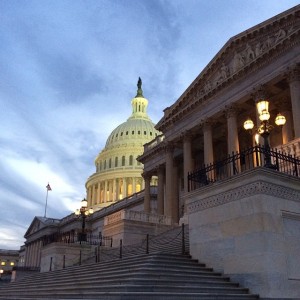On the Hill: AHA to Bring Congressional Attention to Murdered Humanist Bloggers
This year has been a nightmare for atheist bloggers in countries with spotty religious freedom records. First, the Bangladeshi-American author Dr. Avijit Roy, returning from a book event with his wife while on a trip to Bangladesh, was brutally murdered on a public street by a mob of religious extremists wielding machetes. Then came the horrific murder of Oyasiqur (Washiqur) Rhaman, who was also attacked by a group wielding machetes. Finally, Ananta Bijoy Das was attacked and murdered just this month, also by a group of religious extremists wielding machetes. In all of these cases, the atheist bloggers were horrifically murdered in a public area of Bangladesh with witnesses, and yet no one has been convicted in the attacks.
Atheists aren’t the only ones being attacked for their religious views or lack thereof, as minority religious groups around the world, from the Ahmadiyya minority Muslim sect in Pakistan to Christians in Syria and Jews in France, are facing violence and sometimes even institutional discrimination from governments because of their beliefs or religious rituals.
That’s why the American Humanist Association is currently working with US legislators and their staffs to raise awareness about the prejudice and oppression faced by nonbelievers and minority religious groups around the world. In fact, we will be holding a series of congressional briefings in June on this very topic.
These briefings, which will be held in both the US House and the Senate, will update members of Congress and staffers on the current state of international religious freedom and on how the human rights of religious minorities and nonbelievers are being threatened. The panelists for this event will include representatives from advocacy groups that work on behalf of specific religious sects, representatives from the nonreligious community, and US government officials who have been tasked with promoting international religious freedom.
The hope is that these briefings will educate policymakers about this serious problem and will inspire action on the international stage to ensure religious freedom rights. The United States currently gives a substantial amount of aid money to many of the countries where atheists are attacked for their views, including over $150 million to Bangladesh. Future aid funding could be based on the condition that the recipient government addresses the discrimination nonbelievers face in that country, both from society as a whole and from the government through blasphemy laws and other measures. Congress could also take the important step of passing a resolution expressing the opinions of the legislature on international religious freedom and how greater protections for religious freedom are tied to a decrease in violence inspired by religious extremism.
International religious freedom is one of the few nonpartisan issues on the congressional radar today, as the right to believe or not believe free from violence is something that all lawmakers can and should support, regardless of their own political or religious affiliation. By educating Congress on this issue, humanists have the potential not only to help resolve a pressing international issue, but to get the notoriously gridlocked Congress to actually work together towards a solution.

